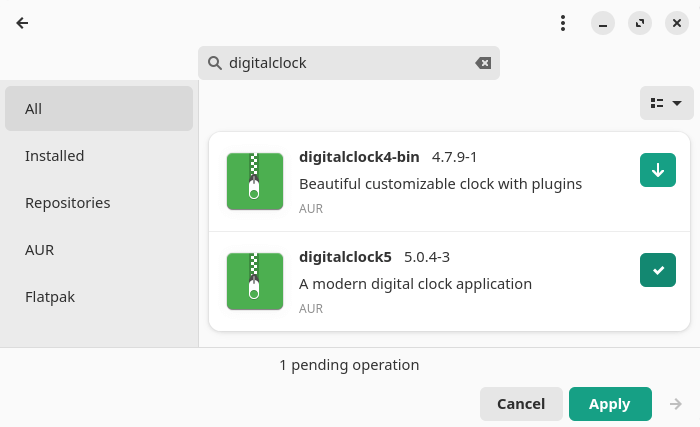One of the strengths of Linux is the vast number of small, niche utilities that are made available under an open source license.
One of the most basic utilities supplied with any operating system is a clock utility. The clock typically resides in the taskbar / menubar, showing the current system time. Nothing very exciting there.
Digital Clock 5 is billed as a very customizable and beautiful clock. It’s written in C++, uses Qt (a popular cross-platform application development framework) and is published under an open source license.
Installation
We evaluated Digital Clock 5 using Manjaro, an Arch-based distro. We installed the software using Pamac (Manjaro’s front-end installation tool).

As you can see, there are two versions of the software present in the AUR. Version 4 is discontinued and the developer doesn’t recommend using it. Instead he recommends using version 5.
The AUR is a community-driven repository. It contains package descriptions (PKGBUILDs) that allow users to compile a package from source with makepkg and then install it via the in-house pacman, a lightweight, simple and fast package manager that allows for continuously upgrading the entire system with one command.
The AUR package built without any issues. However, starting the software from the desktop yielded no output. In this situation, it’s best to run the program from the terminal and see the output.
[sde@linuxlinks ~]$ digitalclock5
digitalclock5: error while loading shared libraries: libPluginCore.so: cannot open shared object file: No such file or directory
Delving a little deeper using the ldd command shows that three shared libraries aren’t found.
[sde@linuxlinks bin]$ ldd digitalclock5
linux-vdso.so.1 (0x00007ffd9f545000)
libPluginCore.so => not found
libSkinEngine.so => not found
libClockCommon.so => not found
These shared libraries are provided by Digital Clock 5, but they are stored in /usr/share/digitialclock5 which is not in our library path. That’s an easy fix though.
Digital Clock 5 is cross-platform software. Besides Linux, it also runs under macOS and Windows. Note for Linux users, Digital Clock 5 doesn’t function under Wayland, you’ll need to be using X11.
Next page: Page 2 – In Operation and Summary
Pages in this article:
Page 1 – Introduction and Installation
Page 2 – In Operation and Summary
